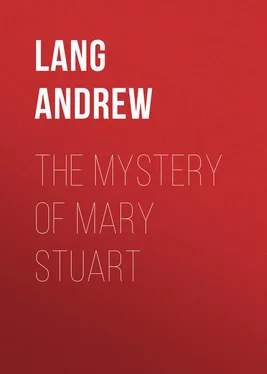Andrew Lang - The Mystery of Mary Stuart
Здесь есть возможность читать онлайн «Andrew Lang - The Mystery of Mary Stuart» — ознакомительный отрывок электронной книги совершенно бесплатно, а после прочтения отрывка купить полную версию. В некоторых случаях можно слушать аудио, скачать через торрент в формате fb2 и присутствует краткое содержание. Жанр: foreign_antique, foreign_prose, на английском языке. Описание произведения, (предисловие) а так же отзывы посетителей доступны на портале библиотеки ЛибКат.
- Название:The Mystery of Mary Stuart
- Автор:
- Жанр:
- Год:неизвестен
- ISBN:нет данных
- Рейтинг книги:4 / 5. Голосов: 1
-
Избранное:Добавить в избранное
- Отзывы:
-
Ваша оценка:
- 80
- 1
- 2
- 3
- 4
- 5
The Mystery of Mary Stuart: краткое содержание, описание и аннотация
Предлагаем к чтению аннотацию, описание, краткое содержание или предисловие (зависит от того, что написал сам автор книги «The Mystery of Mary Stuart»). Если вы не нашли необходимую информацию о книге — напишите в комментариях, мы постараемся отыскать её.
The Mystery of Mary Stuart — читать онлайн ознакомительный отрывок
Ниже представлен текст книги, разбитый по страницам. Система сохранения места последней прочитанной страницы, позволяет с удобством читать онлайн бесплатно книгу «The Mystery of Mary Stuart», без необходимости каждый раз заново искать на чём Вы остановились. Поставьте закладку, и сможете в любой момент перейти на страницу, на которой закончили чтение.
Интервал:
Закладка:
The truth of Arran’s charge is uncertain. In any case, ‘the Queen both honestly and stoutly behaves herself,’ Randolph wrote. While Bothwell lay, a prisoner on suspicion, in Edinburgh Castle, Mary was come to a crisis in her reign. Her political position, hitherto, may be stated in broad outline. The strains of European tendencies, political and theological, were dragging Scotland in opposite directions. Was the country to remain Protestant, and in alliance with England, or was it to return to the ancient league with France, and to the Church of Rome?
During Mary’s first years in Scotland, she and the governing politicians, her brother Moray and Maitland of Lethington, were fairly well agreed as to general policy. With all her affection for her Church and her French kinsmen, Mary could not hope, at present, for much more than a certain measure of toleration for Catholics. As to the choice of the French or English alliance, her ambitions appeared to see their best hope in an understanding with Elizabeth, under which Mary and her issue should be recognised as heirs of the English throne. So far the ruling politicians, Moray, Lethington, and Morton, were sufficiently in accord with their Queen. A restoration of the Church they would not endure. Not only their theological tenets (sincerely held by Moray) opposed any such restoration, but their hold of Church property was what they would not abandon save with life. The Queen and her chief advisers, therefore, for years enjoyed a modus vivendi : a pacific kind of compromise. Mary was so far from being ardently Catholic in politics, that, while Bothwell was confined in Edinburgh Castle, she accompanied Moray to the North, and overthrew her chief Catholic supporter, Huntly, ‘the Cock of the North,’ and all but the king of the Northern Catholics. Before she set foot in Scotland, he had offered to restore her by force, and with her, the Church. She preferred the alliance of her brother, of Lethington, and of les politiques , the moderate Protestants. Huntly died in battle against his Queen; his family, for the hour, was ruined; but Huntly’s son and successor in the title represented the discontents and ambitions of the warlike North, as Bothwell represented those of the warlike Borderers. Similarity of fortunes and of desires soon united these two ruined and reckless men, Huntly and Bothwell, in a league equally dangerous to Moray, to amity with England, and, finally, to Mary herself.
To restore his family to land and power, Huntly was ready to sacrifice not only faith and honour, but natural affection. Twice he was to sell his sister, Lady Jane, once when he married her to Bothwell against her will: once when, Bothwell having won her love, Huntly compelled or induced her to divorce him. But these things lay in the future. For the moment, the autumn of 1562, the Huntlys were ruined, and Bothwell (August 28, 1562), in the confusion, escaped from prison in Edinburgh Castle. ‘Some whispered that he got easy passage by the gates,’ says Knox. ‘One thing,’ he adds, ‘is certain, to wit, the Queen was little offended at his escaping.’ [23] Knox, ii. 347.
He was, at least, her mother’s faithful servant.
We begin to see that the Protestant party henceforward suspected the Queen of regarding Bothwell as, to Mary, a useful man in case of trouble. Bothwell first fled to Hermitage Castle in Liddesdale. As Lieutenant-General on the Border he commanded the reckless broken clans, the ‘Lambs,’ his own Hepburns, Hays, Ormistouns of Ormistoun, and others who aided him in his most desperate enterprises; while, as Admiral, he had the dare-devils of the sea to back him.
Lord James now became Earl of Moray, and all-powerful; and Bothwell, flying to France, was storm-stayed at Holy Island, and held prisoner by Elizabeth. His kinsfolk made interest for him with Mary, and, on February 5, 1564, she begged Elizabeth to allow him to go abroad. In England, Bothwell is said to have behaved with unlooked-for propriety. ‘He is very wise, and not the man he was reported to be,’ that is, not ‘rash, glorious, and hazardous,’ Sir Harry Percy wrote to Cecil. ‘His behaviour has been courteous and honourable, keeping his promise.’ Sir John Forster corroborated this evidence. Bothwell, then, was not loutish, but, when he pleased, could act like a gentleman. He sailed to France, and says himself that he became Captain of the Scottish Guards, a post which Arran had once held. In France he is said to have accused Mary of incestuous relations with her uncle, the Cardinal.
During Bothwell’s residence in England, and in France, the equipoise of Mary’s political position had been disturbed. She had held her ground, against the extreme Protestants, who clamoured for the death of all idolaters, by her alliance with les politiques , led by Moray and Lethington. Their ambition, like hers, was to see the crowns of England and Scotland united in her, or in her issue. Therefore they maintained a perilous amity with England, and with Elizabeth, while plans for a meeting of the Queens, and for the recognition of Mary as Elizabeth’s heir, were being negotiated. But this caused ceaseless fretfulness to Elizabeth, who believed, perhaps correctly, that to name her successor was to seal her death-warrant. The Catholics of England would have hurried her to the grave, she feared, that they might welcome Mary. In the same way, no conceivable marriage for Mary could be welcome to Elizabeth, who hated the very name of wedlock. Yet, while Bothwell was abroad, and while negotiations lasted, there was a kind of repose, despite the anxieties of the godly and their outrages on Catholics. Mary endured much and endured with some patience. One chronic trouble was at rest. The feud between the Hamiltons, the nearest heirs of the crown, and the rival claimants, the Lennox Stewarts, was quiescent.
The interval of peace soon ended. Lennox, the head of the House hateful to the Hamiltons, was, at the end of 1564, allowed to return to Scotland, and was reinstated in the lands which his treason had forfeited long ago. In the early spring of 1565, Lennox’s son, Darnley, followed his father to the North, was seen and admired by Mary, and the peace of Scotland was shattered. As a Catholic by education, though really of no creed in particular, Darnley excited the terrors of the godly. His marriage with Mary meant, to Moray, loss of power; to Lethington, a fresh policy; to the Hamiltons, the ruin of their hopes of royalty, while, by most men, Darnley soon came to be personally detested.
Before it was certain that Mary would marry Darnley, but while the friends and foes of the match were banding into parties, early in March 1565, Bothwell returned unbidden to Scotland, and lurked in his Border fastness. Knox’s continuator says that Moray told Mary that either he or Bothwell must leave the country. Mary replied that, considering Bothwell’s past services, ‘she could not hate him,’ neither could she do anything prejudicial to Moray. [24] Knox, ii. 473.
‘A day of law’ was set for Bothwell, for May 2, but, as Moray gathered an overpowering armed force, he sent in a protest, by his comparatively respectable friend, Hepburn of Riccartoun, and went abroad. Mary, according to Randolph, had said that she ‘altogether misliked his home-coming without a licence,’ but Bedford feared that she secretly abetted him. He was condemned in absence, but Mary was thought to have prevented the process of outlawry. Dr. Hay Fleming, however, cites Pitcairn’s ‘Criminal Trials,’ i. 462, [25] Hay Fleming, p. 359, note 29.
as proof that Bothwell actually was outlawed, or put to the horn. Knox’s continuator, however, says that Bothwell ‘was not put to the horn, for the Queen continually bore a great favour to him, and kept him to be a soldier.’ [26] Knox, ii. 479.
The Protestants ever feared that Mary would ‘shake Bothwell out of her pocket,’ against them. [27] See Cal. For. Eliz. 1565, 306, 312, 314, 319, 320, 327, 340, 341, 347, 351.
Интервал:
Закладка:
Похожие книги на «The Mystery of Mary Stuart»
Представляем Вашему вниманию похожие книги на «The Mystery of Mary Stuart» списком для выбора. Мы отобрали схожую по названию и смыслу литературу в надежде предоставить читателям больше вариантов отыскать новые, интересные, ещё непрочитанные произведения.
Обсуждение, отзывы о книге «The Mystery of Mary Stuart» и просто собственные мнения читателей. Оставьте ваши комментарии, напишите, что Вы думаете о произведении, его смысле или главных героях. Укажите что конкретно понравилось, а что нет, и почему Вы так считаете.












